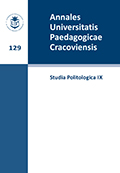Dobre i złe mity przywódców Polski Ludowej
Abstrakt
Myth is a particularly efficient political tool as it imposes an undisputedly defined way of thinking, develops patterns of social behaviours and creates the language of the ruling class and the people. Thus, politicians willingly resort to the use of myths in political discourse. The article is an attempt to present the functions that the myths play and the types of myths that can be encountered in politics. It focuses on the myths of the leaders of the Polish People’s Republic. The myth of a hero was used in the propaganda of the Polish People’s Republic to rebuild the image of the First Secretary - the hero with a revolutionary origin. As a rule, a negative myth of the former head of the party was developed to make the newly created cult seem even more impressive. One can see here the myths of the end and the myths of revival. The negative myth was connected with the myth of the end and the positive myth was associated with the myth of revival. Sometimes the revival myth connected with the First Secretary developed independently, spontaneously, in a bottom-up fashion, as in the case of the myth of Gomułka who was depicted as a good leader persecuted by the supporters of Stalinism.Contemporarily, the myth of “the good host” and patriot E. Gierek is celebrating its revival. Myths usually appear in the time of crisis and longing for the lost memories that idealise the former reality. Each new ruling party used to build the personal prestige of the new leader who should achieve a particular level of charisma after some time, the phenomenon was known as the cult of the First Secretaries. Simultaneously, each new party promised that they would rule in a better fashion, in accordance with the present programme of the party. In the time of the Polish People’s Republic, the magic formula, which could be identified with the myth of the beginning, was the slogan connected with “going back to the origins of Marxism and Leninism.”
The cult of the First Secretaries combined with the idea of going back to the origins of Marxism and Leninism was to give a new impulse to the society and the government, was to authenticate the new leader and his programme connected with the Polish United Workers’ Party (Polska Partia Robotnicza).
Despite doubled propaganda effort, each subsequent political crisis (1956, 1968, 1970, 1980, 1981) caused that the society had less trust in the political power. Finally, in 1989, the society decided to grand its trust to the opposition. And thus, in 1989 a new political power, with its new myth of the beginning, new saviour, and an old negative myth of the end, started to govern.
Pobrania
Opublikowane
2015-08-07
Numer
Dział
Artykuły
Licencja
Redakcja przyjmuje do druku teksty oryginalne, wcześniej niepublikowane. Treść czasopisma jest dostępna na licencji Creative Commons (CC-BY-NC-ND 3.0 PL)
Licencja ta zezwala na wykorzystanie materiałów opublikowanych w czasopiśmie w celach niekomercyjnych np. komentarza, krytyki, informacji, archiwizacji, nauczania lub prowadzenia badań, z poszanowaniem aktualnie obowiązującego prawa autorskiego (ustawa z dnia 4 lutego 1994 r. o prawie autorskim i prawach pokrewnych Dz.U. 1994 nr 24 poz. 83 z poźn. zm.). Zgodnie z wymogami licencji, konieczne jest dokładne podanie źródła cytowania lub parafrazowania oraz zachowanie tekstu w oryginalnej postaci (zakaz tworzenia utworów zależnych).

